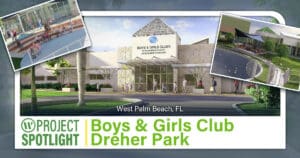
Event Recap: Gold Star Memorial Monument Project Dedication
On Wednesday, September, 25th a new Gold Star Families Memorial Monument was officially unveiled in West Palm Beach, FL.
Learn from award-winning professionals — explore our whitepapers, blogs, and the latest industry updates.
Join our dynamic organization of engineers, land surveyors, landscape architects, environmental scientists, and architects!
Talk to a market leader today! We’ll answer any questions you have about our professional services.

With 6,400 planners in attendance, WGI played a large role in the American Planning Association’s National Planning Conference in San Francisco, California. Lisa Nisenson and Bridget Callea helped co-lead two workshops, spoke on panels, and engaged other attendees on trends in planning.

Lisa and Bridget helped develop and facilitate two workshops on disruptive transportation technologies. The first, “Transportation’s Missing Links: Planning Autonomous Shuttle Pilots,” revolved around an actual setting in Hawaii where shuttles could knit together a University campus, a traditional mall, and residential areas. Participants were required to assess feasibility, potential routes, and supportive site design.

The second workshop, “Corridors 3.0: Smart and Sustainable Redevelopment”, took a closer look at how emerging smart city and mobility technology can play a role in strengthening auto-oriented commercial corridors. The map-based exercise considered a city in Massachusetts that would compete for an autonomous bus rapid transit (BRT) grant. Participants were given a range of criteria, including economic development and ridership potential, and then asked to review whether the city could compete. One of the top lessons from the corridor exercise was that the city was not really a candidate for autonomous BRT, but should leverage existing technologies and improve access to the existing commuter rail line.

In the session “Anticipating and Governing Disruptive Change”, Lisa joined Adriane Jaynes from the City of Tulsa, Oklahoma and Brad Davis from Alta Planning + Design’s West Palm Beach office. This session took a practical look at planning tools, including scenario planning, predictive planning, and using small-scaled pilot projects to test new technologies (such as shared scooters).
Why Autonomous Shuttles? Planners are excited about autonomous shuttles as a nimble type of transit service for campuses and as “first-last mile” access to transit. With nearly 70 autonomous shuttle pilots underway around the country, they are also likely to be the first autonomous vehicle types providing service. WGI is ready to help communities plan and implement new shuttle services and supportive infrastructure. In fact, WGI is helping develop an AV Shuttle pilot checklist for planners though a Transit Cooperative Research Program project, due later this year.
Streets (and Curbs and Sidewalks) of the Future: Curbside management is a hot topic for both urban and suburban areas in the United States. This is thanks in part to technology and the rise in e-commerce deliveries, food delivery services, and ride hailing (think Uber and Lyft) creating congestion on curbsides. Autonomous delivery is on the rise and air and ground drones are expected to fill even more orders in the future. While roadway congestion is long established, WGI will help reshape the design and management of curbs, sidewalks, and possibly airspace as autonomous technology increasingly affects how both people and goods flow.
Getting in Front of Change: The conference featured an entire track on “Managing Change in Communities.” While technology is a big change driver, so too are climate change and economic restructuring, such as the “gig economy.” As such, expect a growing number of planning tools and methods that help anticipate and manage change. As a member of the Board of the Consortium for Scenario Planning, Lisa is on the front lines developing planning tools that incorporate trends such as new technology. The Consortium is a project of the Lincoln Institute for Land Policy in Cambridge MA. For more information on this, visit the Consortium’s website: (www.scenarioplanning.io/resources).

Finally, WGI was asked to participate in the conference’s Tech Zone in the exhibit hall and find ways to make emerging technology fun and engaging. Fortunately, WGI’s creative service and placemaking teams stepped up to the challenge to create “Connected Communities: the Board Game”. Lisa and Bridget play-tested a prototype of the game, which is part Monopoly and part BINGO, with attendees. While the main priority of the game was to teach technology lingo and how it fits with planning, attendees shared that they would also find value for using the game in charrettes and strategic planning sessions.
Contact Lisa Nisenson (lisa.nisenson@wginc.com) or Bridget Callea (Bridget.Callea@wginc.com) if you are interested in the game and how WGI can make it work for you.

WGI is a national design and professional services firm leading in technology-based solutions for the construction of public infrastructure and real estate development. At WGI, we’re providing Tomorrow’s Infrastructure Solutions Today.

On Wednesday, September, 25th a new Gold Star Families Memorial Monument was officially unveiled in West Palm Beach, FL.

WGI was ranked in the top 200 for the tenth consecutive year by Engineering News-Record (ENR) on their Top 500 Design Firms List for 2024.

WGI, in collaboration with industry partners, is helping The Boys & Girls Clubs of Palm Beach County develop a new facility in Dreher Park to serve economically disadvantaged youth in West Palm Beach’s District 5, providing essential programs in a dedicated, community-focused environment.

Melissa’s addition to the team solidifies WGI’s leadership in helping communities harness the benefits of much-needed infrastructure projects throughout the nation.

Rapidly changing e-commerce trends and technologies mean big changes for land-use and infrastructure planning.

Discover how WGI’s innovative urban planning solutions are enhancing community health and conservation in Greenacres, FL. Learn how our team revised the city’s Comprehensive Plan with a focus on sustainability, resilience, and holistic wellness.
You’ve been searching for a place like WGI. We look forward to meeting you soon.
Sign up to receive emails to hear our latest news and achievements in our monthly newsletter.
Enter your zip code, and we’ll personalize your experience with local projects, office locations, team members, and more.
WGI supports its associates with meaningful opportunities for growth, strong benefits and perks, while we work collaboratively with clients and co-consultants to shape and improve communities.






WGI is a dynamic organization with opportunities nationwide for engineers, land surveyors, landscape architects, environmental scientists, and architects.